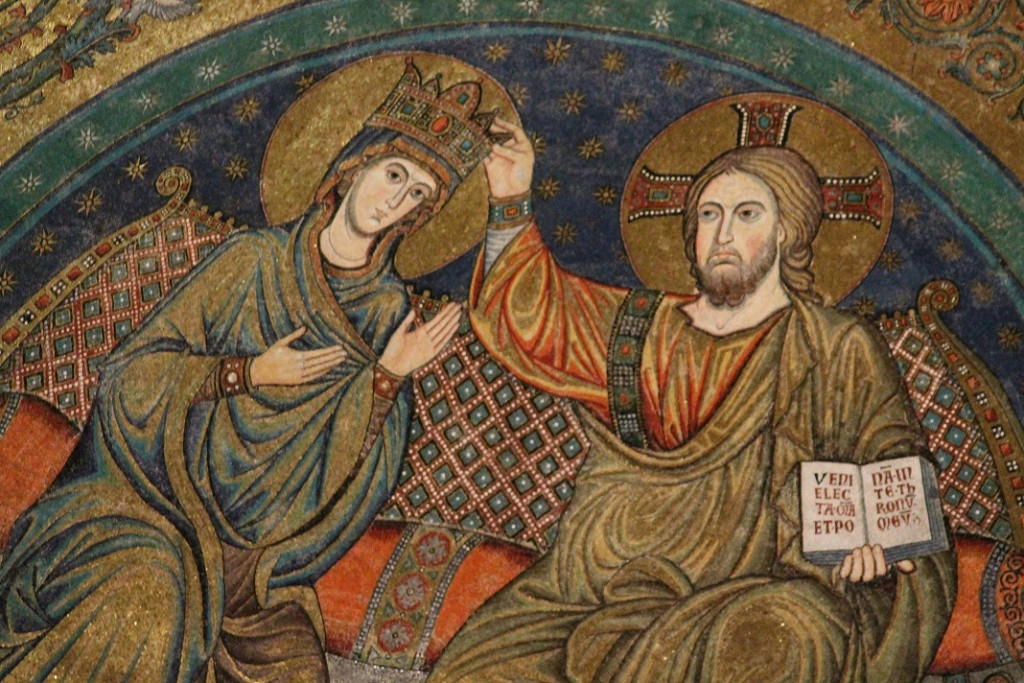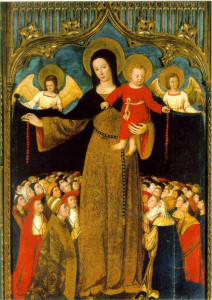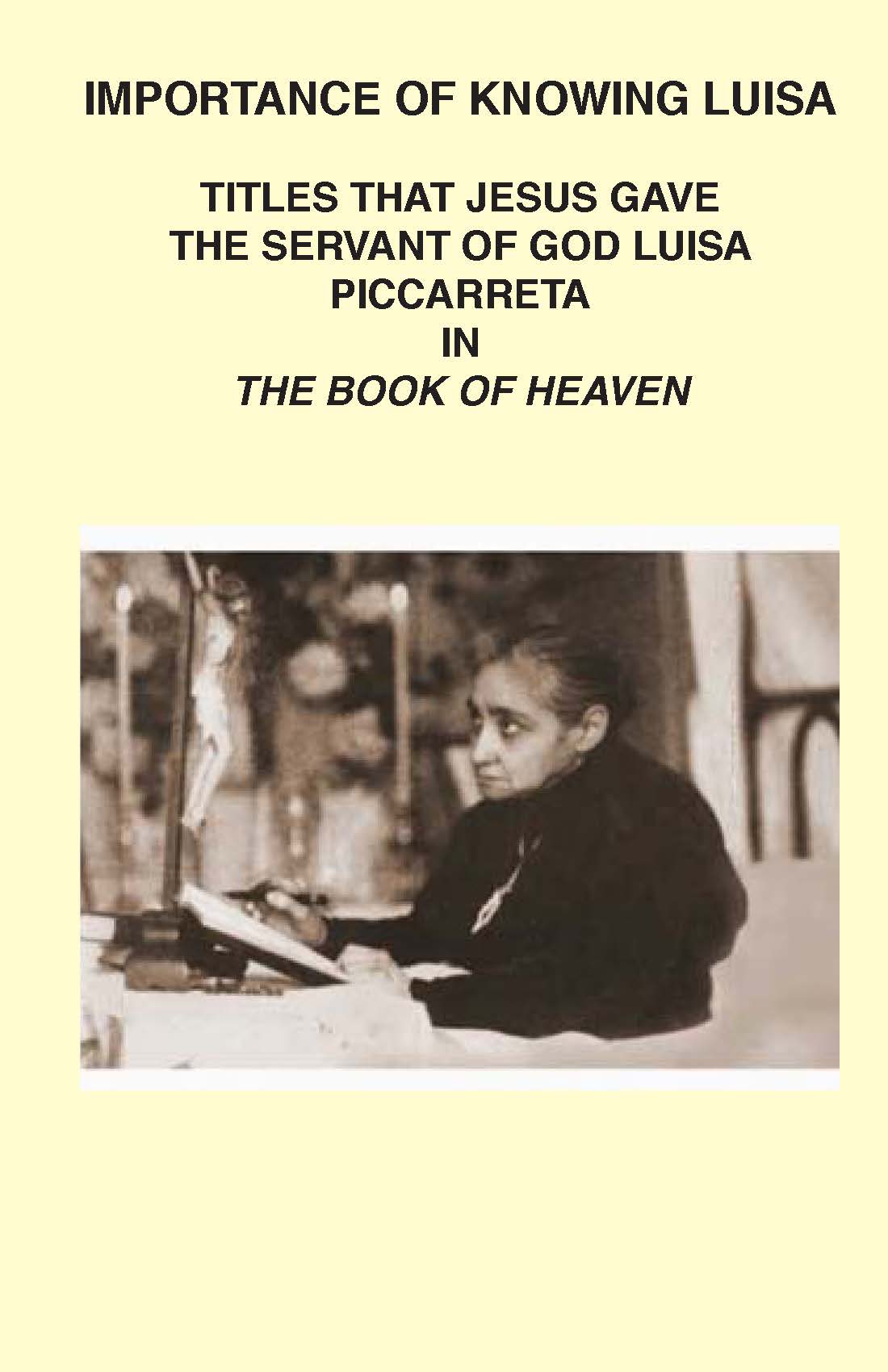What is a Third Order Benedictine Oblate of Divine Will?
Third Order Benedictine Oblates of Divine Will of St. Benedict are Christian individuals or families who have associated themselves with the Benedictine Daughters of Divine Will Community in order to enrich their Christian way of life. Third Order Benedictine Oblates of the Divine Will shape their lives by living the wisdom of Christ as interpreted by St. Benedict and the knowledge of the Truths in The Book of Heaven by The Servant of God Luisa Piccarreta. Third Order Benedictine Oblates of the Divine Will seek God by striving to become holy in their chosen way of life. By integrating their prayer and work, they manifest Christ’s presence in society by reading and putting the Writings of The Servant of God Luisa Piccarreta into practice.
Saint Paul tells us that each member of the body of Christ, the Church, has a special function to perform. Most are called to the married state and the raising of a family. Some are called to the single life in the world and others to the life of a priest or religious man or woman. The role of Third Order Benedictine Oblates of the Divine Will is to live in the world, to become holy in the world, to do what they can to bring the world to God by being witnesses of Christ by word and example to those around them through the Truths in the Writings of The Servant of God Luisa Piccarreta.
Third Order Benedictine Oblates of the Divine Will concern themselves with striving to be what they are, people of God and temples of the Holy Spirit. Their prayer life shall flow from this awareness, as shall their willingness to offer themselves (that is the meaning of the word oblate) for the service of God and neighbor to the best of their ability. Third Order Benedictine Oblates do not take on a new set of religious practices and are not required to say a certain number of prayers or engage in special devotions. They do not live in a religious community or take vows but focus on the Truths found in the Writings of The Servant of God Luisa Piccarreta.
Saint Benedict and Third Order Oblates of Divine Will
Saint Benedict lived in the sixth century. He was born in a small town north of Rome and came to Rome for his education. Before long he abandoned his studies and lived as a hermit for several years at a place called Subiaco, where in time he acquired a reputation for holiness and miracles. Attracting many followers, Benedict established monastic communities at Subiaco, Terracina, and Monte Cassino. It was at Monte Cassino that he wrote a Rule which combined moderation with fidelity to the best traditions in Christian monasticism. During the following centuries, his monastic way of life spread throughout Europe, and Benedictine monasteries and convents became the principal centers of prayer, culture, education, and now, we also shall focus on the Writings of The Servant of God Luisa Piccarreta.
From the very beginning Benedictine monasteries accepted boys, and convents received girls, “offered!’ to them by their parents for their religious training and education. These children lived in the community, shared its daily round of religious activities, and became known as Third Order Benedictine Oblates. In the course of time, lay people asked to be associated with the work of the monks and nuns, without however leaving their homes, families, and occupations. These too were received, offered. themselves to God, became Third Order Benedictine Oblates of a monastery or convent, and promised to regulate their lives according to the spirit of the Rule of St. Benedict. They applied the teachings of the Rule to their lives in the world, in their family circles, in their places of work, in their civic and social activities and especially now through the Writings of The Servant of God Luisa Piccarreta.
Today, throughout the world, there are hundreds of Third Order Benedictine Oblates of the Divine Will praying and working in spiritual union with Benedictine Daughters of Divine Will Community and receiving spiritual strength and inspiration from their association as Third Order Benedictine Oblates of the Divine Will through studying the Truths in the Writings of The Servant of God Luisa Piccarreta.
The Rule: A Guide for Third Order Oblates of Divine Will
Third Order Benedictine Oblates promise to lead an enriched Christian life according to the gospel as reflected in the Rule of St. Benedict. In this way they share in the spiritual benefits of the Benedictine Daughters of the Divine Will Community who are dedicated to the monastic life by vow. After a time of preparation, which culminates in an act of Oblation — a rite approved by the Church — the candidates become Third Order Benedictine Oblates of the Divine Will. This promise affiliates them with the Benedictine Daughters of the Divine Will Community and commits them to apply to their lives the characteristic monastic principles especially through the Writings of The Servant of God Luisa Piccarreta.
Third Order Benedictine Oblates strive after stability and fidelity in their lives by regular worship with other Christians and by the support they give to the social and educational apostolates of their local parishes as well as that of the Church as a whole based on the Truths found in the Writings of The Servant of God Luisa Piccarreta.
In accord with the teaching of Benedict, Third Order Benedictine Oblates of the Divine Will practice moderation. This moderation manifests itself in the use of the goods of this world, an increasing concern to their neighbor, and in the way they temper and direct their desires. Their fidelity to Christian living shall provide a much needed example of genuine Christianity and a stabilizing influence for good on all around them based on the Writings of The Servant of God Luisa Piccarreta.
In the spirit of the gospel, Third Order Benedictine Oblates of the Divine Will commit themselves to a continual conversion to and communion with Christ. They see sin and any attachment to it as basically incompatible with a serious following of Christ. Through this deepening of the baptismal promise, Third Order Benedictine Oblates of the Divine Will are free to put on Christ and to allow him to permeate their lives. In this way Third Order Benedictine Oblates of the Divine Will shall come to recognize that in all the phases and events of their lives, in their joys and successes as well as in their sorrows and disappointments, they are in close union with Christ and participate in His very death and resurrection. This ‘putting on of Christ’ is the goal the Third Order Benedictine Oblates of the Divine Will pursue in their conversion of life based on the Writings of The Servant of God Luisa Piccarreta.
In the spirit of obedience, Third Order Benedictine Oblates of the Divine Will strive to discover and maintain their proper relationship toward God, their family, and the civil and religious society in which they live. Before God, Third Order Benedictine Oblates of Divine Will must come to recognize themselves as creatures dependent on their Creator and as sinners before their Redeemer. Aware of their own spiritual poverty and need of God, Third Order Benedictine Oblates of Divine Will come to realize that they have no other reason for being, except to be loved by God as Creator and Redeemer and to love and seek him in return in wanting to be Sanctified based on the Writings of The Servant of God Luisa Piccarreta.
In loving obedience to God’s plan, Third Order Benedictine Oblates of Divine Will develop a deep reverence for life. They shall respect life as a Precious Gift in the Divine Will from God and defend those groups which because of age, health or race are defenseless and most open to attack. Seeking harmony and integrity of life, they perpetuate and enhance the traditional Benedictine motto: “Peace.” Personally and together with other Christians, Third Order Benedictine Oblates of Divine Will work to promote living as a member of The Family of Nazareth. They take care to seek out opportunities for the practice of charity and warm hospitality to those around them as they strive to live the Truths in the Writings they read and put into practice from The Servant of God Luisa Piccarreta.
Third Order Oblate Spirituality of Divine Will
Third Order Benedictine Oblates of the Divine Will seek God in association with the Benedictine Daughters of Divine Will Community: as individuals and as members of a body, they grow in love of God, neighbor, and self. With the Rule as their guide, Third Order Benedictine Oblates of Divine Will adopt values that are part of the very fabric of Christian spirituality, such as, spending time daily reflecting on the Sacred Scriptures and the writings of The Servant of God Luisa Piccarreta; cultivating an awareness of the presence of God in silence; devoting time to the praise of God; performing acts of mortification. An acquaintance with these and other Christian values presented in the Rule of St. Benedict shall enable Third Order Benedictine Oblates of the Divine Will to attain that special peace and joy that Christ came to bring and promised to all who follow him as especially taught by Jesus in the Writings of The Servant of God Luisa Piccarreta.
The Director of Third Order Benedictine Oblates of the Divine Will provides direction and instruction through letters or meetings. Conferences, group discussions, common prayers, and participation in the community’s liturgical life afford Third Order Benedictine Oblates of the Divine Will the opportunity for spiritual growth. In offering this assistance to the individual Third Order Benedictine Oblate of the Divine Will, the guiding principle is that stated by St. Benedict in chapter 64 of his Rule: “Let the Abbot so moderate all things that there be something for the strong to strive after, and nothing to dishearten the weak,” and also to grow in the knowledge of the Truths from The Book of Heaven by The Servant of God Luisa Piccarreta.
Fiat!
 Loading...
Loading...
 On the 1st April, we will celebrate the fourth in the series of the five first Saturday’s of the month in reparation of offences against Our Lady’s Immaculate Heart. In this month’s meditation, we will offer reparation for all those who publicly seek to sow in the hearts of children, indifference, or scorn or even hatred of this Immaculate Mother. This attitude tears at Our Lady’s maternal heart because they also reject her maternal care for the salvation of their souls. These hard-hearted souls argue that honouring Our Lady is “idolatry” because such veneration is only due to God. St Thomas Aquinas reminds us that honour is given to the king’s mother on account of the king. This is the case with Mary. At Fatima, Our Lady requested that we pray for these poor sinners, her lost children, to convert them to the truth.
On the 1st April, we will celebrate the fourth in the series of the five first Saturday’s of the month in reparation of offences against Our Lady’s Immaculate Heart. In this month’s meditation, we will offer reparation for all those who publicly seek to sow in the hearts of children, indifference, or scorn or even hatred of this Immaculate Mother. This attitude tears at Our Lady’s maternal heart because they also reject her maternal care for the salvation of their souls. These hard-hearted souls argue that honouring Our Lady is “idolatry” because such veneration is only due to God. St Thomas Aquinas reminds us that honour is given to the king’s mother on account of the king. This is the case with Mary. At Fatima, Our Lady requested that we pray for these poor sinners, her lost children, to convert them to the truth. Each evening at Vespers the Church sings Mary’s great canticle of praise to God – the Magnificat. It is with Mary’s words that the Church praises God as the day draws to a close because she is the believer par excellence! She is the one who can teach us a true canticle of praise. In the Magnificat, Mary tells us the motive for which she will be honoured: it is because the “Almighty has done great things for her” (cfr. Lk1:48) by choosing her to be the Mother of Christ. Mary’s greatness, by her own account, resides in the fact of her Son! She is the Lord’s humble servant who wants only the Magnify the Lord, or, in other words, tell of His greatness.
Each evening at Vespers the Church sings Mary’s great canticle of praise to God – the Magnificat. It is with Mary’s words that the Church praises God as the day draws to a close because she is the believer par excellence! She is the one who can teach us a true canticle of praise. In the Magnificat, Mary tells us the motive for which she will be honoured: it is because the “Almighty has done great things for her” (cfr. Lk1:48) by choosing her to be the Mother of Christ. Mary’s greatness, by her own account, resides in the fact of her Son! She is the Lord’s humble servant who wants only the Magnify the Lord, or, in other words, tell of His greatness.



















